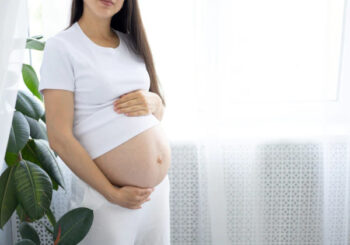By John Patterson
Staff Writer for Wake Up World
Mothers hold an extraordinary influence in shaping their children’s destinies, and emerging research delves deeper into the profound connections between a mother’s past adversities during childhood or pregnancy and its lingering effects on their 2-year-old children’s gut microbiomes.
Spearheaded by a team of UCLA psychologists, this groundbreaking study reveals the world’s first evidence of transgenerational impacts, shedding light on how early-life stress leaves an indelible mark on the delicate interplay of the gut-brain axis.
The gut microbiome, an intricate community of microorganisms residing in the digestive system, is now recognized as more than just a digestive aid. It is believed to significantly influence brain and immune functions, hinting at a potential role in shaping the socioemotional development of young children. The revelations from this research open up a new frontier of understanding, where the experiences of mothers can reverberate through generations, calling for a deeper exploration of the gut-brain connection and its implications for human health and well-being.
The Transgenerational Impact on the Gut Microbiome
Published in Proceedings of the National Academy of Sciences, the study unveils how the children of mothers who endured hardship exhibit small to medium changes in their gut microbiomes. The gut microbiome is a vast and diverse community of microorganisms that reside in the digestive system, and its significance extends beyond digestion, influencing the brain and immune system. The findings highlight the potential role of the gut microbiome as a mediator between early-life adversity and socioemotional development.
The Gut Microbiome-Brain Connection
Recent research has emphasized the critical role of the gut microbiome in regulating brain function and mental health. Changes to the gut microbiome may be one of the mechanisms through which childhood hardship impacts a child’s socioemotional development, paving the way for a deeper understanding of how early-life experiences shape an individual’s overall well-being.
The Link Between Adversity and Gut Microbiomes
The study builds upon previous investigations in rodents, which demonstrated that prenatal stress could disrupt maternal vaginal and gut microbiomes. Since infants acquire their initial gut microbes during birth, the mother’s microbiome lays the groundwork for their offspring’s gut health.
Similarly, past research on humans revealed that stress experienced by infants in the womb, as well as the mother’s psychological distress, can influence the infant microbiome shortly after birth. However, the long-term impact of such disturbances and their potential to affect future generations remained a mystery until now.
Studying the Consequences
To uncover the effects of maternal adversity, the researchers examined 450 mother-child pairs in Singapore when the children reached 2 years old. Mothers were asked to recollect any abuse, neglect, or maltreatment they experienced during their own childhoods, while anxiety levels during the second trimester of pregnancy were also assessed. Additionally, primary caregivers were interviewed to identify stressful events the children experienced during their first two years of life.
Results and Observations
The study found that children whose mothers reported higher levels of anxiety during pregnancy had gut microbiomes with more even populations of microorganisms. Biologists refer to this measure of even distribution as “evenness,” and this phenomenon had not been observed before in the context of gut microbiomes. Typically, the populations of various species in the gut’s microflora exhibit variations in abundance, but in this study sample, those differences were less prominent, and populations were more evenly distributed.
Furthermore, children who experienced stressful life events after birth showed less genetic diversity among their gut microbes compared to the typical diversity observed in healthy children. In other words, the microorganisms residing in each child’s gut were more closely related to each other.
Implications for Socioemotional Development
Interestingly, while adversity correlated with less microbial genetic diversity in each child, it did not appear to significantly impact the overall similarity between children’s gut microbiomes. There was still variation among the children.
Francesca Querdasi, the paper’s lead author and a UCLA doctoral student, shared insights into the potential significance of these findings: “There are a lot of questions around whether more diversity or evenness is better or worse when the gut microbiome is developing during childhood, so we don’t know if more is better at 2 years old. However, many species related to adversity interact with the immune system, suggesting that the gut microbiome’s interaction with the immune system may change after adversity.”
Nutritional Psychiatry: The Road Ahead
The link between the brain and gut microbiome undergoes rapid development during the first two to three years of life, a crucial period for shaping a child’s health and well-being. Understanding the changes in the gut microbiome due to adversity provides a compelling opportunity for a new field of study called nutritional psychiatry, which explores how changes in diet can impact mental health through the brain-gut microbiome connection. As we delve deeper into this intricate relationship, it opens up the possibility of positively influencing an individual’s gut microbiome and broader developmental trajectory through diet, supplements, and lifestyle interventions.
Conclusion
This ground breaking research offers profound insights into the complex interplay between childhood hardship, maternal gut microbiomes, and their influence on children’s gut microbiomes and socioemotional development. As scientists continue to explore this emerging field, the potential to enhance human health by understanding and nurturing the gut microbiome becomes increasingly apparent.
It serves as a wake-up call for both parents and researchers to proactively support the well-being of children from their earliest stages of life, recognizing the transformative power of the gut-brain connection in shaping future generations. With this newfound knowledge, we can pave the way for a healthier and more resilient society, where early-life experiences are understood and harnessed to foster a brighter future for generations to come.
Reference:
- Chang-Yu Chang, Djordje Baji?, Jean C. C. Vila, Sylvie Estrela, Alvaro Sanchez. Emergent coexistence in multispecies microbial communities. Science, 2023; 381 (6655): 343 DOI: 10.1126/science.adg0727
About the author:
John Patterson is an avid writer and researcher who delves into the latest scientific research. With an insatiable curiosity, he translates complex concepts into accessible narratives, allowing readers to embark on a journey of discovery. Through his work, John bridges the gap between experts and the public, igniting curiosity and inspiring meaningful conversations about scientific breakthroughs.

If you've ever found value in our articles, we'd greatly appreciate your support by purchasing Mindful Meditation Techniques for Kids - A Practical Guide for Adults to Empower Kids with the Gift of Inner Peace and Resilience for Life.
In the spirit of mindfulness, we encourage you to choose the paperback version. Delve into its pages away from screen glare and notifications, allowing yourself to fully immerse in the transformative practices within. The physical book enriches the learning process and serves as a tangible commitment to mindfulness, easily shared among family and friends.
Over the past few years, Wake Up World has faced significant online censorship, impacting our financial ability to stay online. Instead of soliciting donations, we're exploring win-win solutions with our readers to remain financially viable. Moving into book publishing, we hope to secure ongoing funds to continue our mission. With over 8,500 articles published in the past 13 years, we are committed to keeping our content free and accessible to everyone, without resorting to a paywall.








